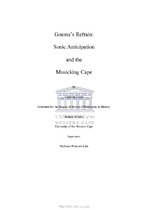| dc.description.abstract | This thesis traces the making of a social world of the musicking Cape through sound, which it
calls sonic anticipation. Sonic anticipation is threaded through a Cape-based musicking
milieu called goema in the Nineteenth century, and through the regional jazzing culture that
emerged in Cape Town in the latter part of the Twentieth century. A key concern is to read
the sonic archive of Cape music without folding into a representational discourse of
(apartheid) group identity or of a Cape exceptionalism.
First, the thesis explores goema's emergence as folk music. In a central example, sonic
anticipation is discernible in the intensities of a song called Daar Kom die Alibama
[translated as ‘There Comes the Alibama’]. This song enabled goema to secure a status as
racialised folk memory. Later in the Twentieth century, the song set the scene for a rearticulation
that laid claim to the city as a response to the 'anxious urbanity' of race formation.
This shift from the Nineteenth to Twentieth century musicking tradition is at the heart of
what we have come to know as Cape jazz.
In its genealogical construction of Cape jazz, the thesis traces a prefigurative aesthetics and
politics that proposes new ways of thinking about the political significance of jazz. It traces
the pedagogic strategies that musicians – Tem Hawker, Winston Mankunku, Robbie Jansen
and Alex van Heerden - used in pursuing ‘ethical individuation’ with this racialised folk
memory. By the early 1960s, jazz had become a method ‘archive’ or formative canon for
these musicians. The thesis outlines how musicians used ‘nomadic’ pedagogies; following
the energies that moved through the city, inside the technological, and discursive formations
by which the social world was made. This thesis on goema’s refrain and the musicking Cape
offers a way to consider a ‘difference that is not apartheid’s difference’. | en_US |

